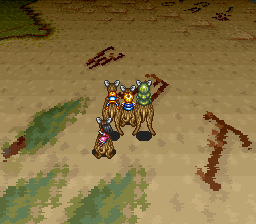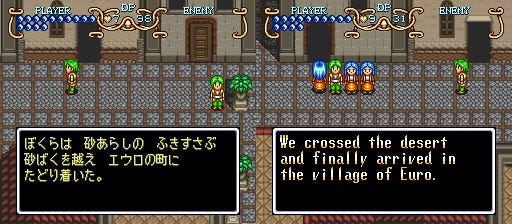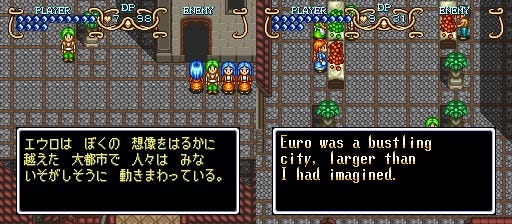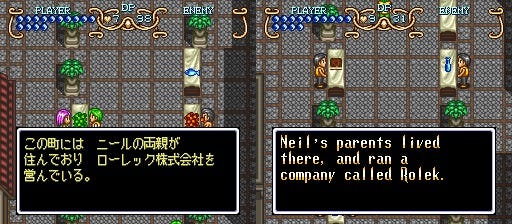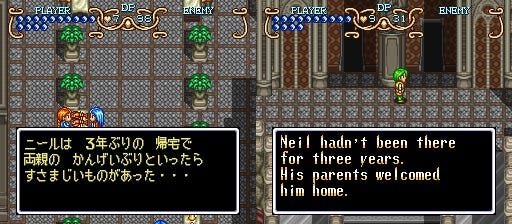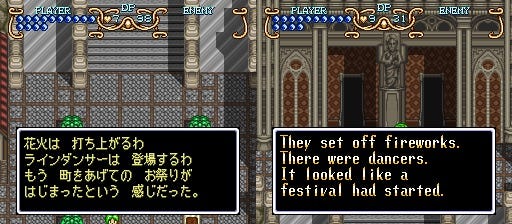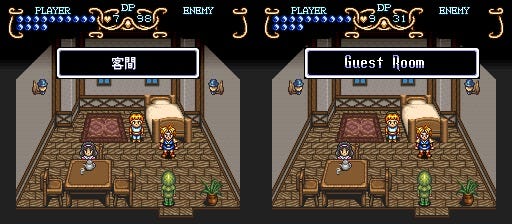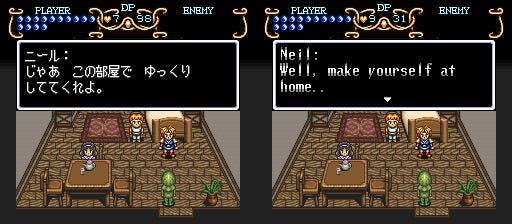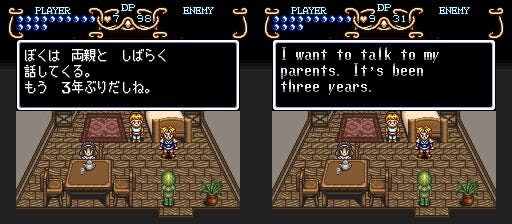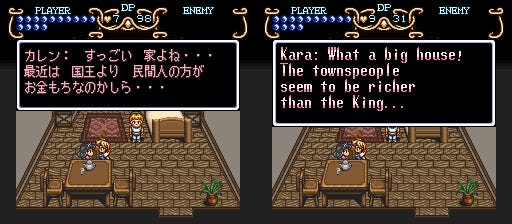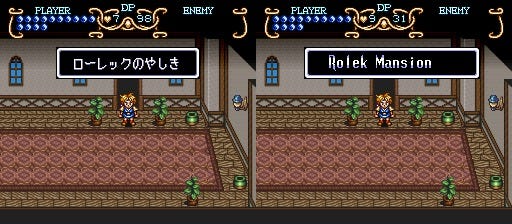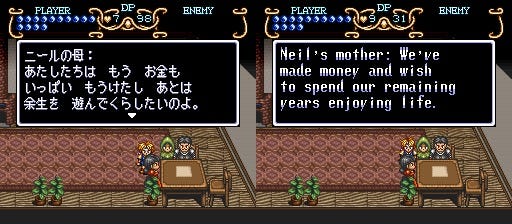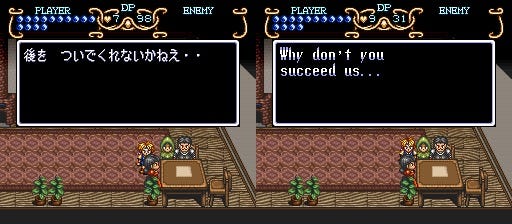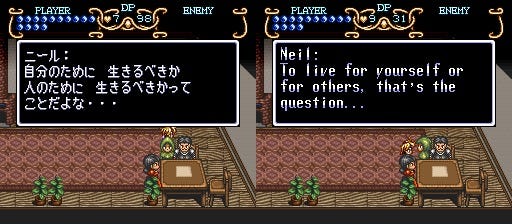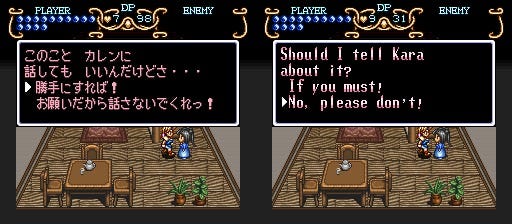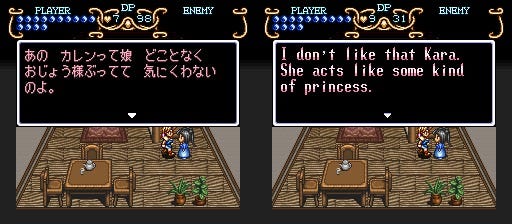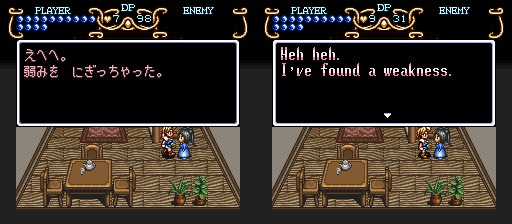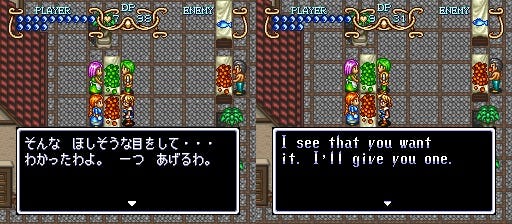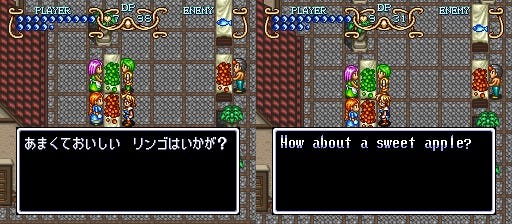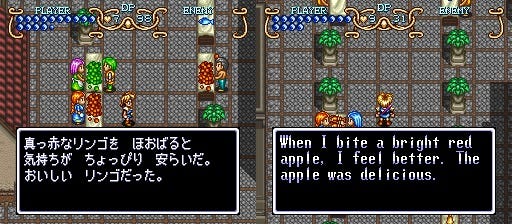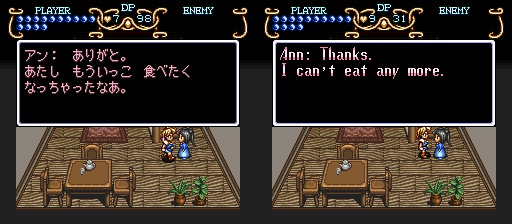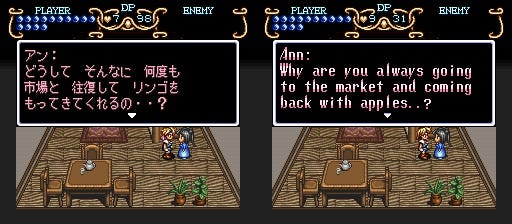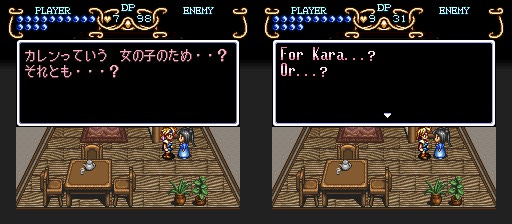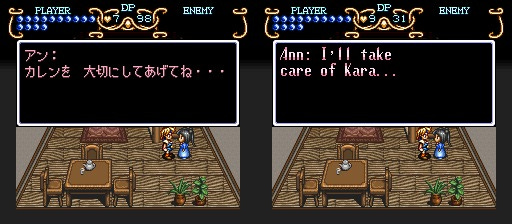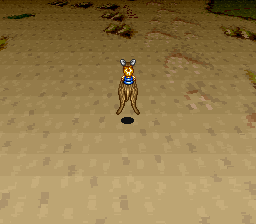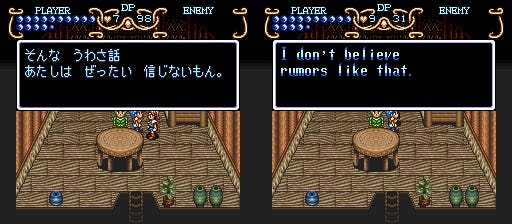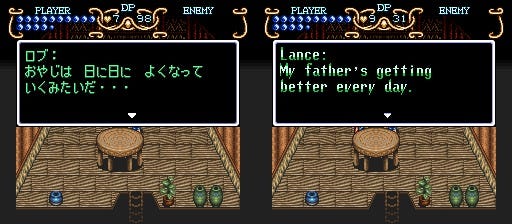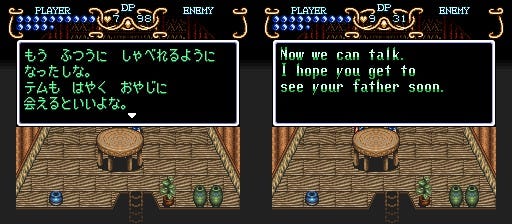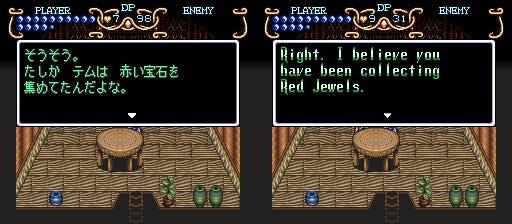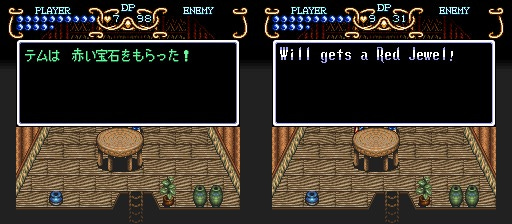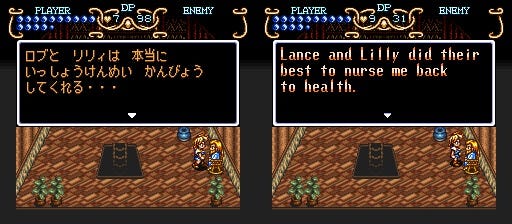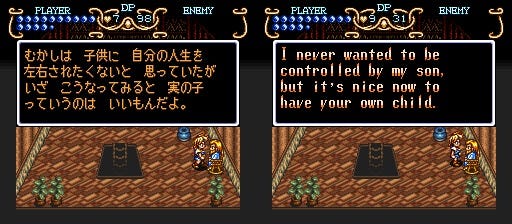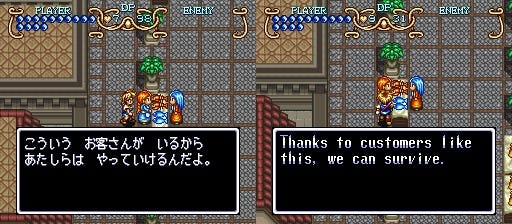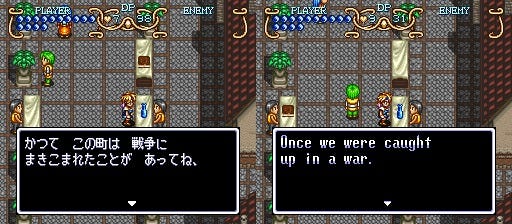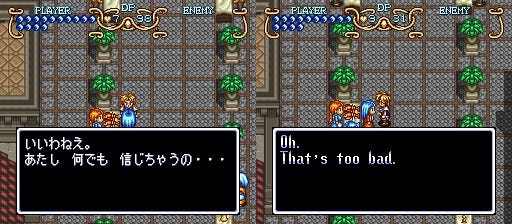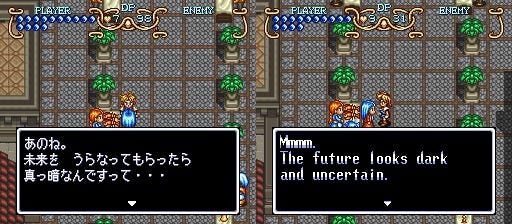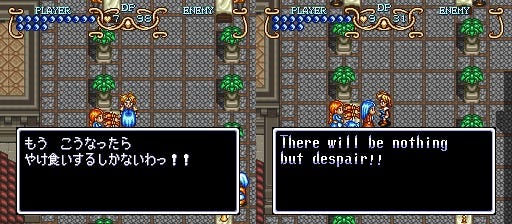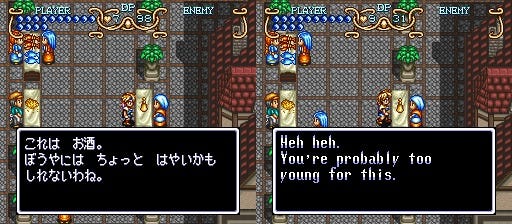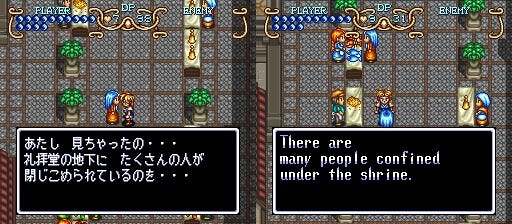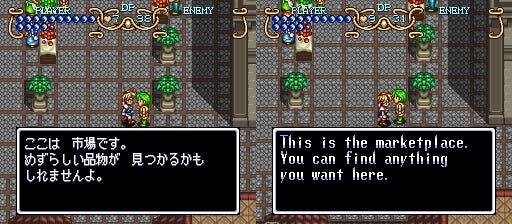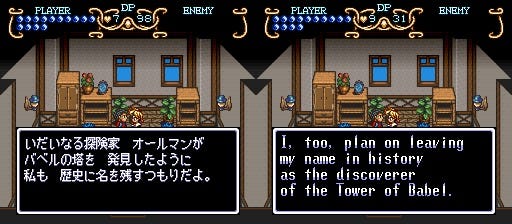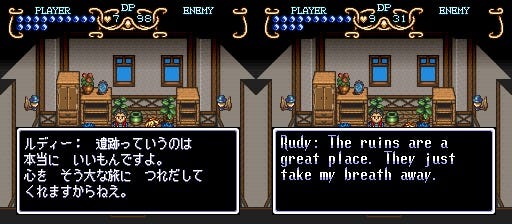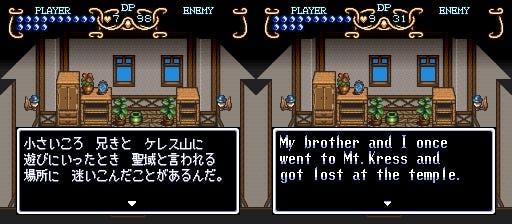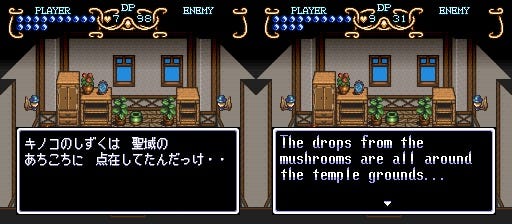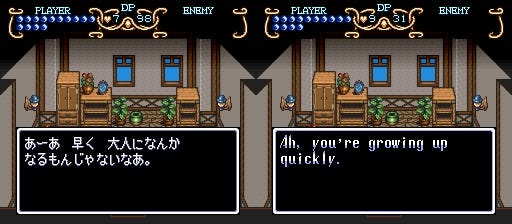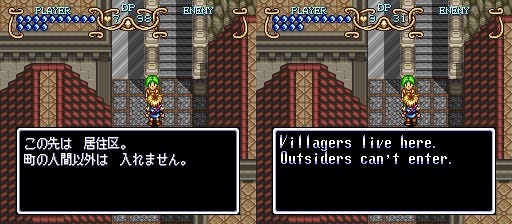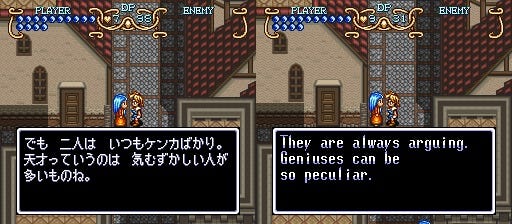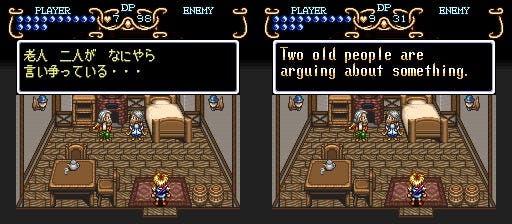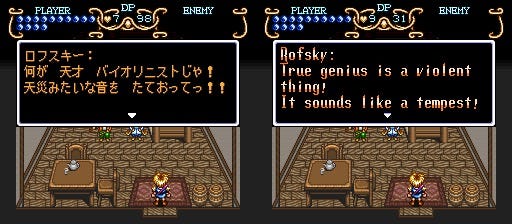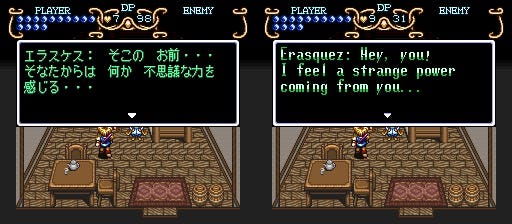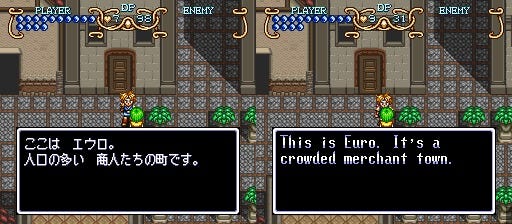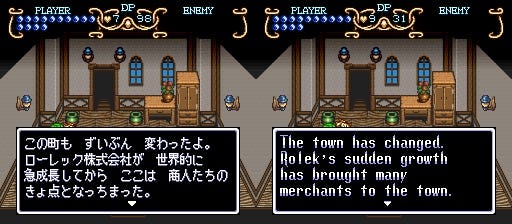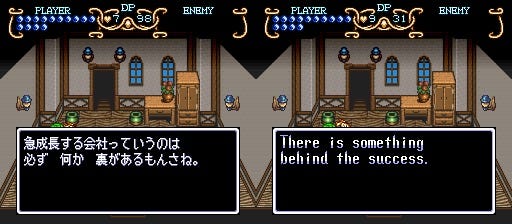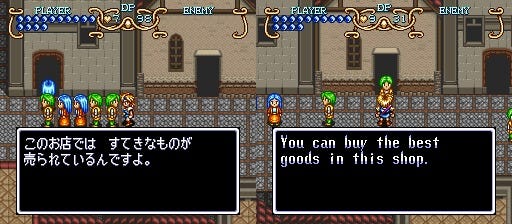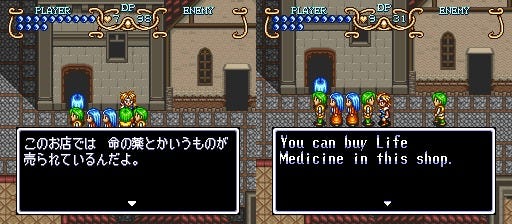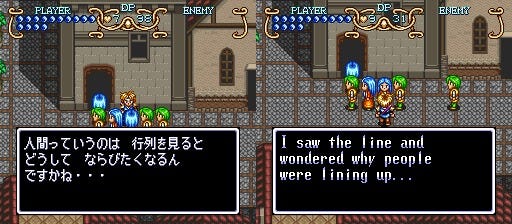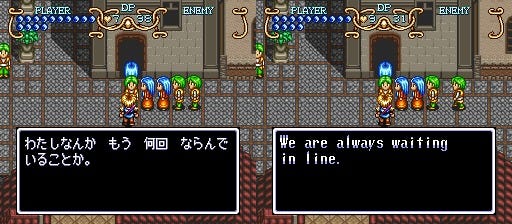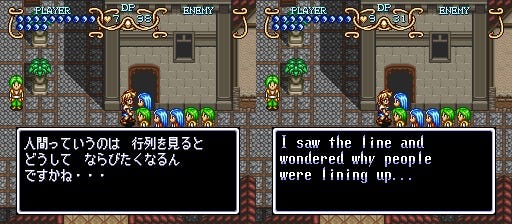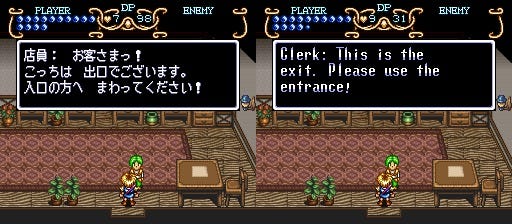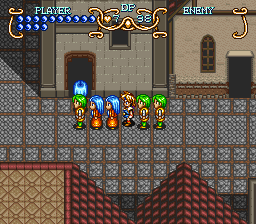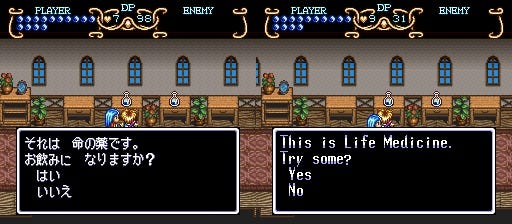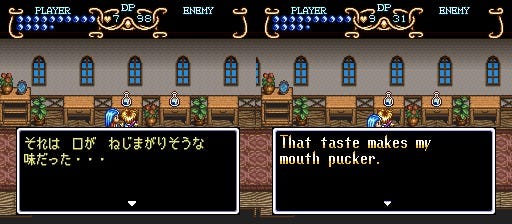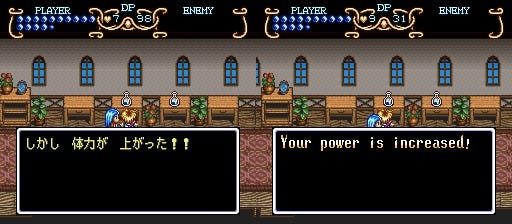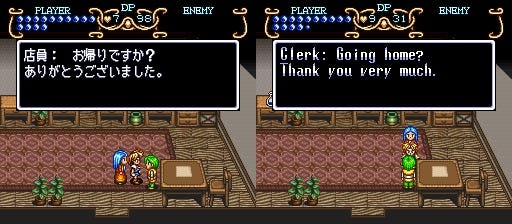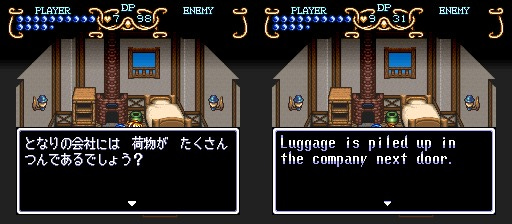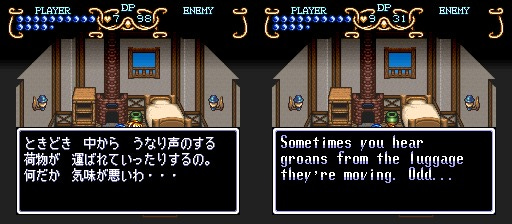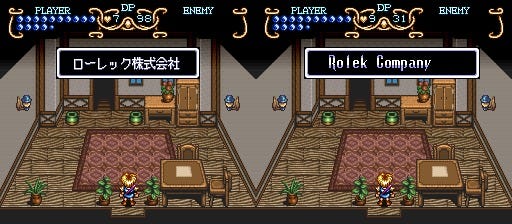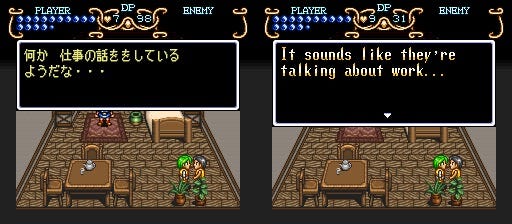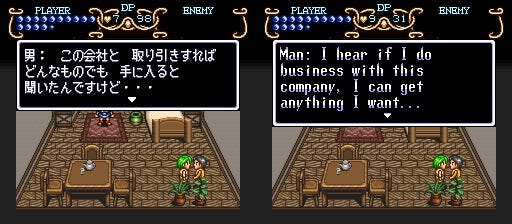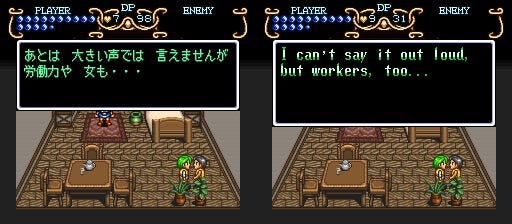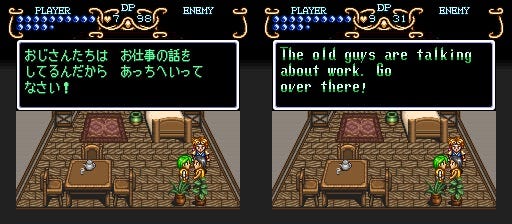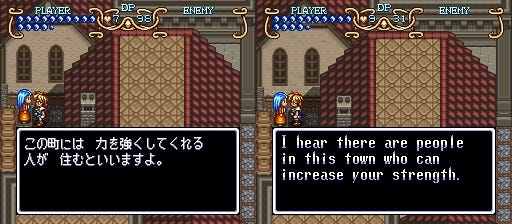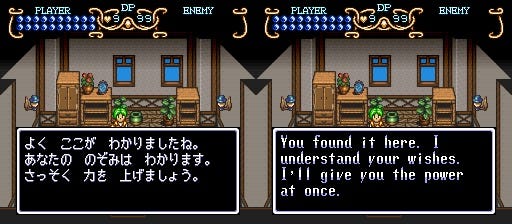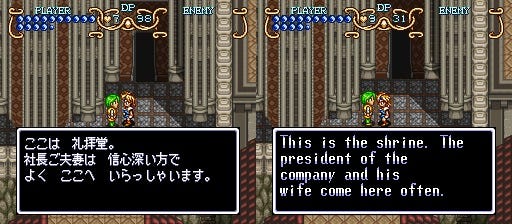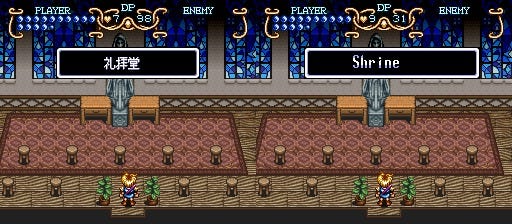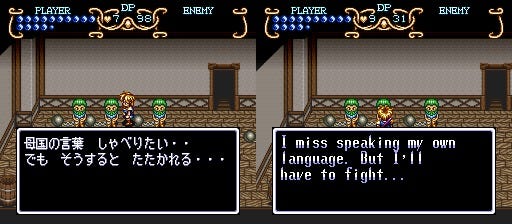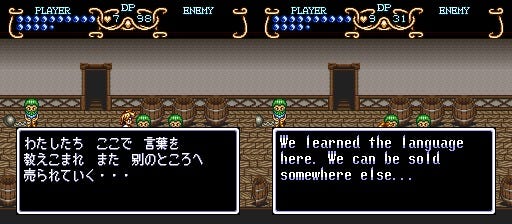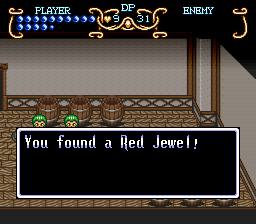The usual disclaimers:
I’m an amateur. My advantage over the original translation is that I have no deadline pressure, and I have the modern internet to help me. I’m assuredly wrong about some of my translations.
Translation is hard. When I point out a mistranslation, it’s not a judgment of the original translators. They had a deadline and poor resources.
Please no jokes in the comments about Karen being a Karen. I really hate that trend.
Notation reminder:
JP: Original Japanese
T: My translation
OE: Original English
The 4 friends head to Euro on krukback. They even get a special map animation, where they’re all riding on kruks and the kruks hop up and down. Cute.
There’s nothing special going on with the Mode 7 map this time. It says Euro in both versions:
JP: 大都市 エウロ
T: Euro Metropolis
OE: City of Euro
It uses the word 大都市 (daitoshi) which means big city or metropolis. OE understandably uses a shorter word to save space. By the way, we’d pronounce Euro as your-oh in English, but in Japanese it’s eh-oo-ro. Sounds more like arrow. This is closer to how the currency is pronounced in Italy or Spain. But in Japanese it’d typically be ユーロ (yuuro), sounding similar to English. Japanese Wikipedia even has a chart for how it’s pronounced in various places:
T (mind these pronunciations are romanizations of the JP, not the way you’d represent these sounds in English):
German: oiro
English: iyarou
French: uro, uho (pronunced with the ʁ sound of Paris)
Dutch: eeroo
Greek: evuro
Finnish, Italian: euro
Spanish: euro
Neat. I learned things today.
JP: ぼくらは 砂あらしの ふきすさぶ 砂ばくを越え エウロの町に たどり着いた。
エウロは ぼくの 想像をはるかに 越えた 大都市で 人々は みな いそがしそうに 動きまわっている。
T: After having braved a fierce sandstorm in the desert, we finally arrived at the city of Euro.
Euro was a bustling metropolis, far larger than I had imagined.
OE: We crossed the desert and finally arrived in the village of Euro.
Euro was a bustling city, larger than I had imagined.
JP: この町には ニールの両親が 住んでおり ローレック株式会社を 営んでいる。
ニールは 3年ぶりの 帰宅で 両親の かんげいぶりといったら すさまじいものがあった...
T: Neil’s parents live in this town and run a public company called Rolek.
After having been gone for 3 years, the way Neil’s parents celebrated his return was unbelievable.
OE: Neil’s parents lived there, and ran a company called Rolek.
Neil hadn’t been there for three years. His parents welcomed him home.
ローレック (roorekku) could be translated a few different ways. The real Rolex company is ローレックス (roorekkusu) in Japanese. So I’m sticking with Rolek. Which, let’s be clear, is totally different from Rolex. They are different companies and any of the bad things that Rolek does are not accusations against Rolex. Got it? Good. Don’t sue us.
JP: 花火は 打ち上がるわ ラインダンサーは 登場するわ もう 町をあげての お祭りが はじまったという 感じだった。
そして ここが ニールの両親の 住む おやしき。 ぼくらは 客間に とおされた。
T: Fireworks were launched and line dancers were brought out. It felt like a town-wide festival had started.
Here is the house where Neil’s parents live. We were led to the guest room.
OE: They set off fireworks. There were dancers. It looked like a festival had started.
This is the house where Neil’s parents live. We were shown to the guest room.
JP: 客間
T + OE: Guest Room
JP: ニール: じゃあ この部屋で ゆっくり しててくれよ。
ぼくは 両親と しばらく 話してくる。 もう 3年ぶりだしね。
T: Well then, make yourselves at home in this room.
I’m going to talk to my parents for a moment. It’s been 3 years.
OE: Neil: Well, make yourself at home..
I want to talk to my parents. It’s been three years.
Here we gain control and can talk to Tim’s buddies.
JP: エリック: こんな 広い家だと 夜 おしっこに いきたくなったら どうするんだろ...
T: Erik: I don’t know what I’d do if I had to go pee in the middle of the night in such a huge house.
OE: Erik: I’m scared! What if I have to go to the bathroom and I can’t find it?
I translated this literally, but the OE is quite good.
JP: カレン: すっごい 家よね... 最近は 国王より 民間人の方が お金もちなのかしら...
T: Karen: What an amazing house! I wonder if some civilians are richer than kings, these days.
OE: Kara: What a big house! The townspeople seem to be richer than the King…
I chose my translation because she said 最近 (saikin - recently/nowadays). I think she’s saying I wonder if it’s now possible for private citizens to be more wealthy than a king.
The impetus for the thought is Neil’s parents, and the only kingly wealth she’s familiar with is her father’s. So I wonder if Neil’s parents are now richer than my father wouldn’t be far from my interpretation. Any combination of these two is also reasonable.
But OE somehow has implications far from any of that. In OE it sounds like she’s saying I think the people of this town are all individually richer than my father (who is the only king in the world).
JP: ローレックのやしき
T + OE: Rolek Mansion
The house is big, in terms of distance you have to run between rooms, but ultimately it’s only 4 rooms including this hallway. I guess you’re supposed to use your imagination. In the first room are Neil and his parents. You can’t speak to Neil’s father.
JP: ニールの母: あたしたちは もう お金も いっぱい もうけたし あとは 余生を 遊んでくらしたいのよ。
後を ついでくれないかねえ..
T: Neil’s mother: We’ve already earned enough money, and we want to spend our remaining years enjoying our lives.
Why don’t you succeed us?
OE: Neil’s mother: We’ve made money and wish to spend our remaining years enjoying life.
Why don’t you succeed us…
JP: ニール: 自分のために 生きるべきか 人のために 生きるべきかって ことだよな...
T: Neil: Should I live entirely for myself, or should I live for the sake of others?
OE: Neil: To live for yourself or for others, that’s the question…
In the far left room, there’s a girl. I am not clear on her relation to Neil. His sister?
JP: アン: 何日か前のことだけど 青黒いマントを はおった男が 入ってきてね、
カレンという娘が この町に きてないかって 言うのよ。
T: Ann: This was several days ago, but a man wearing a bluish black cloak came to town.
He asked if a girl named Karen had come to this town.
OE: Ann: A few days ago, a man wearing a cloak came around.
He asked if anyone named Kara had come to town.
JP: あの こおりそうな目を 見ただけで あたし ちぢみ あがっちゃった。
このこと カレンに 話しても いいんだけどさ...
>勝手にすれば!
>お願いだから話さないでくれっ!
T: Just looking at his cold eyes made me cower.
Maybe I should tell Karen about it…
>Do what you want!
>I beg you, don’t tell her!
OE: I shrank with fear when I saw his cold eyes.
Should I tell Kara about it?
>If you must!
>No, please don’t!
Extortion, is it? If you say that you don’t care:
JP: あの カレンって娘 どことなく おじょう様ぶってて 気にくわない のよ。
あなたがそういうなら いじめちゃおっかなあ。
T: That Karen girl puts on airs like she’s a princess. I don’t like her.
So if that’s your answer, I guess I get to go ahead and bully her.
OE: I don’t like that Kara. She acts like some kind of princess.
You shouldn’t be so cruel, talking that way.
OE confused me in the past. She doesn’t like Karen, but she cares that I’m being cruel to her? Why does she bother to say she doesn’t like the girl? It makes sense now: she brought it up to preface why she wants to be mean to Karen. She’s not chiding Tim, she’s doing that “Welllll, I guess I’ll just go ahead and do that thing you say you don’t care about! Here I go! I’m gonna do it! Any moment now!” thing.
If you beg her not to tell Karen:
JP: えへへ。 弱みを にぎっちゃった。
あーあ。 あたし リンゴが 食べたいなあ。 市場で 買ってきてっ!
T: Hee hee. Looks like I found your weakness.
Ooh! I want an apple. Go buy one from the marketplace!
OE: Heh heh. I’ve found a weakness.
Aah. I want an apple. Let’s go to the marketplace!
Before I explore the town of Euro, I’m going to take care of this little side quest, which gives you a red jewel in the end. Down in the marketplace, an apple vendor will give them to you for free. (I mean, maybe Tim pays and it’s not shown. This game doesn’t have currency.)
JP: そんな ほしそうな目をして... わかったわよ。 一つ あげるわ。
テムは リンゴをもらった!
T: I can tell by the look in your eyes that you want an apple. Ok. You can have one.
Tim took the apple!
OE: I see that you want it. I’ll give you one.
Will got the apple!
There’s no special dialogue if you talk to her before Ann has asked for an apple. She always gives you one. If you speak to her with an apple already in your possession:
JP: あまくておいしい リンゴはいかが?
T: How about a sweet, delicious apple?
OE: How about a sweet apple?
If you hurry to do the side quest, you might not notice that the apple is a proper inventory item.
JP: まっかなリンゴ
エウロのいちばで もらったリンゴ。
T: Bright red apple
Apple received from Euro marketplace.
OE: Red Apple
Apple from Euro Market.
If you eat the apple:
JP: 真っ赤なリンゴを ほおばると 気持ちが ちょっぴり 安らいだ。 おいしいリンゴだった。
T: When I stuffed my cheeks with the bright red apple, I felt a tiny bit more at ease. It was delicious.
OE: When I bite a bright red apple, I feel better. The apple was delicious.
One feature of Japanese is that sentences can have multiple verbs, and if all of them are in present tense except for the final verb, which is in past, you can interpret all of the verbs as past tense. Here, when I stuff cheeks is present tense but I felt at ease is past. They should both be past in English, but OE decided to change the final verb to present instead. The result is that in OE he’s implying whenever I bite any bright red apple, I always feel better, totally disconnected from the action of biting this particular apple. Then there’s a verb tense conflict with the next sentence.
The apple, when used as an item, restores exactly 1 HP. Not the most useful thing in the world. The main purpose is to take them to Ann.
JP: アン: ありがと。 あたし もういっこ 食べたく なっちゃったなあ。
T: Ann: Thanks. I’m starting to want another one.
OE: Ann: Thanks. I can’t eat any more.
You’re supposed to bring 3 apples to Ann, so the OE’s mistranslation here probably threw some players off. Here the なあ (naa) at the end of the sentence doesn’t indicate negation. It’s more like saying well or I tell you or some other kind of minor emphasis like that.
When you’ve finally given her enough:
JP: アン: どうして そんなに 何度も 市場と 往復して リンゴを もってきてくれるの..?
カレンっていう 女の子のため..? それとも...?
T: Ann: Why do you keep going to the market and bringing back apples over and over?
Is it for Karen’s sake? Or something else?
OE: Ann: Why are you always going to the market and coming back with apples..?
For Kara…? Or…?
I don’t know what she’s trying to imply, here. That Tim has a crush on her?
JP: まあ いいわ。 おれいに この宝石をあげる。
テムは 赤い宝石を 手に入れた!
T: Well, ok. I’ll give you this jewel.
Tim got a red jewel!
OE: Good. As a present I’ll give you this jewel.
Will gets a Red Jewel!
I only included the generic red jewel receiving message to point out my appreciation for OE fixing the colors. This is non-Tim narration, so the text should be white.
If you talk again she now repeats this:
JP: アン: カレンを 大切にしてあげてね...
T: Ann: Take good care of Karen, ok?
OE: Ann: I’ll take care of Kara…
I’ll take care of Karen would be 大切にしてあげる (taisetsuni shite ageru). But she says 大切にしてあげて (taisetsuni shite agete) which in this case I interpret as an imperative.
There are two other red jewels to find around town, and one that you can only find if you backtrack to Watermia. If you do so, Tim will bounce back on a kruk alone:
Rob, Lily, and Rob’s father all have new things to say.
JP: リリィ: おっきい星が しょうとつするとか いやなうわさが 飛びかってるわ。
そんな うわさ話 あたしは ぜったい 信じないもん。
T: Lily: There’s an awful rumor going around that we’re going to collide with a huge star.
I don’t believe that kind of rumor.
OE: Lilly: Rumor is we’re going to collide with a big star.
I don’t believe rumors like that.
I always found this line weird, and this is a case where translating from JP didn’t help much. Because she’s been adventuring with me, Lily must know more relevant details about the comet than almost any human alive. It’s weird to say she just doesn’t believe rumors like that, she knows they’re BS, and that the real risk is from the comet’s light.
JP: ロブ: おやじは 日に日に よくなって いくみたいだ...
もう ふつうに しゃべれるように なったしな。 テムも はやく おやじに 会えるといいよな。
T: Rob: It seems like my dad’s getting better day by day.
Now he and I can actually have a conversation. I hope you get to see your father soon.
OE: Lance: My father’s getting better every day.
Now we can talk. I hope you get to see your father soon.
JP: そうそう。 たしか テムは 赤い宝石を 集めてたんだよな。
おやじの 持ち物の中から 赤い宝石が 見つかったんだよ。 もっていきな。
T: Oh, yeah. I’m pretty sure you were collecting red jewels.
I found one in my dad’s belongings. Here, take it.
OE: Right. I believe you have been collecting Red Jewels.
I found a Red Jewel in my father’s possessions. Please take it.
Cheers for OE’s correct colors again! If you talk to Rob, he simply repeats the line about hoping Tim gets to see his father soon.
Like Rob said, his father is now lucid and finally has different dialogue.
JP: ロブの父: おお... テムじゃないか。 心配をかけて すまんかったな。
ロブと リリィは 本当に いっしょうけんめい かんびょう してくれる...
T: Rob’s father: Oh… it’s Tim, right? I’m sorry for worrying you.
Rob and Lily have truly given their all to nurse me back to health.
OE: Lance’s father: Oh, Will. Sorry I made you worry.
Lance and Lilly did their best to nurse me back to health.
JP: むかしは 子供に 自分の人生を 左右されたくないと 思っていたが いざ こうなってみると 実の子 っていうのは いいもんだよ。
T: Back in the day, I thought I didn’t want a kid to do things for me. But now, when I need help, I’m glad my own child is there for me.
OE: I never wanted to be controlled by my son, but it’s nice now to have your own child.
左右 can mean two words. One is pronounced sayuu:
Obviously left and right makes no sense here, so OE believed it meant influence or control. But there’s another word that sometimes uses the kanji 左右. It’s pronounced tokaku and more often uses the kanji 兎角:
The verb immediately following is されたくない (saretakunai) which means do not want to be done. I’m sure this second word was intended, since Rob is currently helping his father, not controlling him. Rob’s dad is saying do not want this and that to be done, not do not want to be controlled.
One last curiosity in Watermia. Remember Luke? In the JP version he stood outside his own house for days after he was supposed to have left on a fishing trip.
In the US version they sent him away after the Great Wall events, and he disappears from the game forever. In the JP version, he’s still there, delivering the same dialogue telling Tim and friends to use his house as they like.
Rob and Lily are never letting him back inside, are they?
It’s time to explore Euro proper. There’s a man standing outside of the Rolek Mansion:
JP: これは ローレック株式会社の 社長夫妻の住む おやしきです。
T: This is the residence of the married couple who are the presidents of the Rolek corporation.
OE: The president of Rolek lives in this mansion.
Directly below the Rolek mansion, there’s a marketplace. If you talk to the merchants on the wrong side of the table, all but one say the same thing:
JP: こらこら こっち側に きちゃ ダメだよ。 お客さんは 反対側に まわって おくれっ!
T: Hey! You’re not supposed to be over here. Customers need to go around to the other side!
OE: Hey! Don’t ever go over there. Cross over to the other side!
Cross over to the other side sounds like an imperative to go die, doesn’t it?
The one exception is a fish vendor who has someone standing in front of her. It’s impossible to talk to her from the customer side of the table:
JP: こういう お客さんが いるから あたしらは やっていけるんだよ。
T: It’s thanks to customers like this that we’re able to make a living.
OE: Thanks to customers like this, we can survive.
JP: この町には 細い裏路地が多いわよ。 家と 家の すきまに 入りこめたり することもあるの。
T: There are many narrow back alleys in this town. You can fit in the gaps that are in between houses.
OE: There are many back alleys between the houses in town.
JP: 何日か前に ブラックパンサーとか 名乗る男が ふらりと やってきて いろいろと 聞きまわっていたよ。
あの目つきは 殺し屋に まちがい ないなあ。 いったいだれを 追っているんだか。
T: Several days ago, a man calling himself the Black Panther showed up out of nowhere and went around asking lots of questions.
With that look in his eyes, no doubt he’s a professional killer. Who in the world was he after?
OE: The other day, a man called the Jackal was asking questions.
He had the look of evil. I think he was chasing someone.
JP: これは ティアポット。 わかりやすく言うと 「なみだつぼ」 ということになる。
T: This is called a Tearpot.
OE: This is a teapot. We call it a “Tear Pot”.
This is a little tough to translate. First she says that it’s a Tearpot, but she uses the English words. ティアポット (tiapotto). Then she explains that it’s called such because it’s a tearpot, but she uses the Japanese words. なみだつぼ (namida tsubo - tears pot). A literal translation would be: This is a Tearpot. It’s called that because it’s a pot for tears. Which of course sounds silly.
OE decided to use the normal word teapot first. The translators might not have known this, but the bottle actually shown in the game is clearly not a teapot. It doesn’t have a handle or spout.
I removed the name explanation entirely. It serves no purpose in English.
JP: かつて この町は 戦争に まきこまれたことが あってね、
女たちは 夫を兵士として 送り 出したあと なみだを このツボに ためて 帰りを まっていたという エピソードのある ものなんだ。
T: Once, this town got dragged into a war.
The women, after seeing their husbands off to war, would save their tears in these pots.
OE: Once we were caught up in a war.
After the women sent their husbands to war, they saved their tears in these pots.
The vendor on the opposite side of that one is kind of interesting. In the JP version, there’s nothing on his table. But stranger than that, you can’t talk to him from the correct side of the table at all. You can only talk to him from the wrong side, where he gives the same scolding message as everyone else. However, there’s a book at a stall with no vendor on the opposite side of the market from him, and you can examine the book for some text.
In the US version, the book and its dialogue was moved in front of this silent vendor.
JP:それは ロフスキーという人が書いた 本だよ。 人類の未来を 予言しているのさ。
T: This is a book written by a man named Rofsky. It’s a prediction about the future of mankind.
OE: This is the book that Rofsky wrote about the future of mankind.
It’s a good thing they moved it, too, because I wouldn’t have checked that book otherwise. I didn’t even notice it until I was reviewing this post. I thought this line was completely made up for the US version.
JP: あなた うらないは 信じるほう?
T: Do you believe in fortune telling?
OE: Believe in fortune-telling?
If no:
JP: いいわねえ。 あたし 何でも 信じちゃうの...
T: That’s good. I’ll believe anything.
OE: Oh. That’s too bad.
In JP she uses the phrase いいわね (iiwane) which is usually translated as that’s nice. It can express admiration, but it can also express jealousy. I think she’s saying that she envies Tim’s ability to not believe every stupid thing. I appreciate her self awareness.
If yes:
JP: あのね。 未来を うらなってもらったら 真っ暗なんですって...
ものすごく 大きい ほうき星が 地のふちを かすめて 人間は 死に絶えるんですって..
T: Let me tell you something. When I got a fortune reading, I was told that the future was bleak.
I was told a horrifically large comet will pass close to the earth, and mankind will die out.
OE: Mmmm. The future looks dark and uncertain.
A huge comet will enter Earth’s orbit. Mankind will become extinct.
OE makes it out as if this girl is telling Tim’s fortune, rather than telling Tim about when she got a fortune reading. She says うらなってもらったら (uranattemorattara) which means when get [unidentified actor] to tell fortune. She follows that with a phrase ending in って (tte), implying that the phrase was a quotation.
The fortune teller said that the future was 真っ暗 (makkura). This literally means pitch black, but can also mean bleak future or poor prospects.
JP: もう こうなったら やけ食いするしかないわっ!!
T: If this is true, there’s nothing to do about it but binge eat!
OE: There will be nothing but despair!!
…That’s why she’s shopping at this fish market. And that adds a bit of cynicism to the vendor’s dialogue, who was thankful for “customers like this” providing her livelihood. This customer has a problem! This game’s JP dialogue is a minefield. You never know which NPC is actually saying something really messed up.
Don’t worry, gullible binge eating lady. I, a 15 year old boy who bonks monsters with a flute, will save the world from the comet.
JP: これは とうもろこしの粉。 パンの 原料に なるんだよ。
T: This is corn meal. It’s an ingredient for bread.
OE: This is corn meal, for making bread.
JP: これは お酒。 ぼうやには ちょっと はやいかも しれないわね。
T: This is alcohol. You’re probably too young for this.
OE: Heh heh. You’re probably too young for this.
Alcohol censorship is unsurprising. I couldn’t figure out what this was supposed to be from the sprite. Like, is that a weird sex toy?
Anyway, Tim drank a bunch of shots on a raft until a guy died, so he can actually handle his alcohol fairly well.
JP: あたし 見ちゃったの... 礼拝堂の地下に たくさんの人が 閉じこめられているのを...
T: I accidentally saw something. In the chapel basement, there are a lot of people imprisoned.
OE: There are many people confined under the shrine.
Uh. That sounds bad.
JP: うちの フルーツは やわらかくて うまいぞ。
T + OE: Our fruit is soft and tasty.
JP: この町が うるおっているのは ローレック株式会社の おかげ。
悪いうわさも けっこうあるけど ぼくは やっぱり あの会社は すごいと 思いますよ。
T: This town has prospered thanks to the Rolek corporation.
There are quite a few bad rumors about it, but at the end of the day, I think the company is terrific.
OE: The town prospers thanks to the Rolek company.
There are lots of bad rumors, but I think the company is great.
JP: ここは 市場です。 めずらしい品物が 見つかるかも しれませんよ。
T: This is the marketplace. You might be able to find some rare items here.
OE: This is the marketplace. You can find anything you want here.
We’re finally done with the market segment of town. Moving on to the northeast part, there’s a house with three guys standing in it.
Guy on the left:
JP: マックス: 今度は どこへ 探検に 連れて いかれるんだろう...
まったく 艦長の 気まぐれにも 困ったもんだよ。 トホホ。
T: Max: I wonder where we’ll be taken to on the next expedition.
It’s frustrating that it’s all up to the caprice of the captain. Boo hoo hoo.
OE: Max: I wonder where you’re taking us exploring this time…
I’m afraid it’s up to the whims of the captain. Heh heh.
トホホ (tohoho) may sound like a laugh, but it’s really equivalent to mock crying. This guy’s upset that the captain is so whimsical.
Guy in the middle:
JP: フリーゼル: 私は 探検家のフリーゼル。
いだいなる探検家 オールマンが バベルの塔を 発見したように 私も 歴史に名を残すつもりだよ。
T: Friesel: I’m the explorer, Friesel.
Like the great explorer Allman, who discovered the Tower of Babel, I too intend my name to go down in history.
OE: Friezer: I am the explorer, Friezer.
I, too, plan on leaving my name in history as the discoverer of the Tower of Babel.
OE’s mistranslation is hilarious. “I’ll make my mark on history by discovering something that has already been discovered.” Cool plan. JP mentions Allman by name, so I don’t know how this came about.
I think that his name is supposed to be a reference to ランゲルハンス島航海記 (rangeruhansushimakoukaiki): Chronicles of the Islets of Langerhans Voyage. Published in 1992, it describes a fictional sea voyage. (The islets of Langerhans is a name of a real thing, but they’re not actually islets. It refers to regions of the pancreas that contain endocrine cells.)
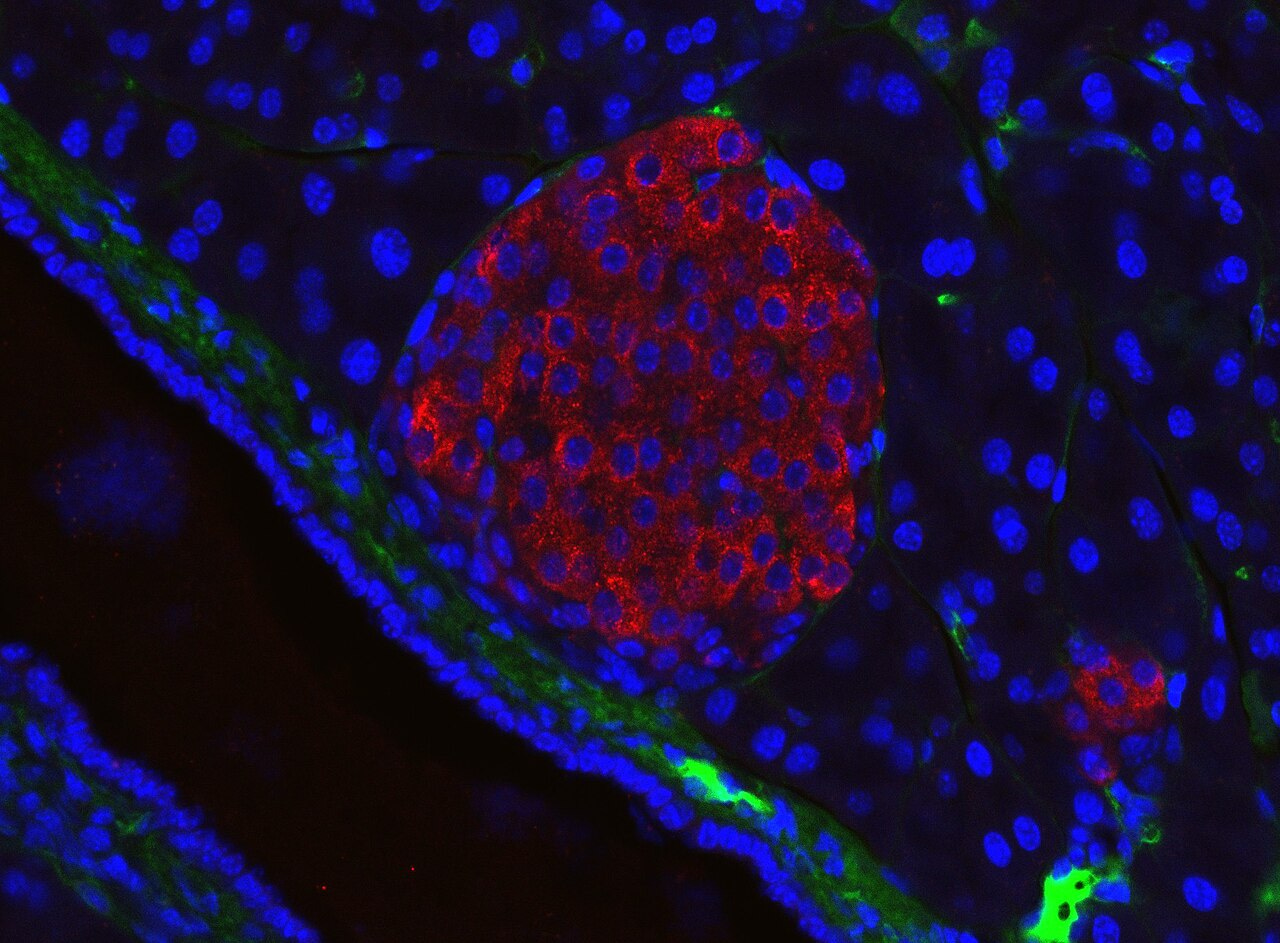
The book appears to be a parody, filled with characters who have medical names or names related to politicians. The story is told by the fictional character Neuronimus Nodulus Friesel. It was published in 1992 and this game was released in Japan in 1993, so maybe this is cutting it too close to have been an intentional reference. But right or wrong, I’m using Friesel, because Friezer is a ridiculous name.
Guy on the right:
JP: ルディー: 遺跡っていうのは 本当に いいもんですよ。 心を そう大な旅に つれだして くれますからねえ。
T: Rudy: The ruins are really great. They entice me to go on big journeys.
OE: Rudy: The ruins are a great place. They just take my breath away.
I’m not confident in my translation of this one. I think it says it’s because they lure heart on big journeys but I can’t figure out what そう (sou - a gazillion definitions) is doing before 大 (dai - big). In any case, this guy likes the ruins. Whatever I might have messed up, I don’t think it would change that conclusion.
The next house over just has Gem in it. The house past that has two people in it. The first says:
JP: 小さいころ 兄きと ケレス山に 遊びにいったとき 聖域と言われる 場所に 迷いこんだことがあるんだ。
でっかいキノコと 植物のクキが まるで 迷路のように生えてたっけ。
T: When I was little, I went to Mount Ceres with my brother. We got lost in a place called the Sacred Grounds.
I remember huge mushrooms and plant stems grew together like a maze.
OE: My brother and I once went to Mt.Kress and got lost at the temple.
Big mushrooms and plants grow in circles like a maze.
Mount Ceres is ケレス山 (keresusan). ケレス (keresu) is the name of the dwarf planet and goddess. I guess the original translators didn’t recognize the word.
He continues:
JP: キノコのしずくを クキのとぎれた 場所にたらすと とつぜん 植物が 動き出して 通路ができたんだ。 これも みんな すてきな思い出さ。
T: When I dribbled Mushroom Drops onto broken plant stems, there was sudden plant growth and a new path appeared. It’s a really fond memory of ours.
OE: Water from the mushrooms drips onto broken stems. New growth sprouts up, forming a path.
The other brother:
JP: キノコのしずくは 聖域の あちこちに 点在してたんだっけ..
あーあ 早く 大人になんか なるもんじゃないなあ。
T: I remember that Mushroom Drops are dotted here and there in the Sacred Grounds.
Ahhh, don’t be in a hurry to become an adult.
OE: The drops from the mushrooms are all around the temple grounds…
Ah, you’re growing up quickly.
OE always sounded weird here. This person talks as if he knows you. In actuality, he’s reflecting on a fond memory from childhood and telling Tim to cherish being young.
JP: この先は 居住区。 町の人間以外は 入れません。
T: Past this point is a residential area. Outsiders can’t enter.
OE: Villagers live here. Outsiders can’t enter.
I appreciate that the game is at least pretending that Euro is bigger than just the area you get to explore. Every other town seems to consist only of the tiny explorable area.
JP: この家には 世界的に 有名な 大文学者 ロフスキーと バイオリニスト エラスケスが 住んでいるの。
でも 二人は いつもケンカばかり。 天才っていうのは 気むずかしい人が 多いものね。
T: This house is where the world famous writer Rofsky and the violinist Erasquez live.
But the two do nothing but argue with each other. Many geniuses are difficult people.
OE: This is where the world-famous, Rofsky, and the violinist, Erasquez, live.
They are always arguing. Geniuses can be so peculiar.
It occurs to me that the OE is never quite specific about what Rofsky actually does or why he’s a genius. All you get is that he wrote a book about “the future of mankind.” JP is clear that he’s a 有名な 大文学者 (yuumei na daibungakusha) which means a very famous scholar/literary figure/writer. I chose writer because later Erasquez is going to call him a モノカキ (monokaki - writer/author).
Before meeting those two, there’s one more person standing outside:
But she’s just repeating the same thing about narrow alleys between buildings. On to meet Rofsky and Erasquez! We can’t go to the next dungeon without talking to them first.
JP: 老人 二人が なにやら 言う争っている...
T + OE: Two old people are arguing about something.
JP: ロフスキー: 何が 天才 バイオリニストじゃ! 天災みたいな音を たておってっ!!
T: Rofsky: What kind of geni-us violinist are you supposed to be? More like a disastr-ous violinist.
OE: Rofsky: True genius is a violent thing! It sounds like a tempest!
What Rofsky’s literally saying is more like you sound like a natural disaster. He doesn’t repeat the word violinist the way I did.
Rofsky is engaging in some wordplay that can’t be translated directly. The words genius (天才) and natural disaster / calamity (天災) are both pronounced tensai. I tried to take advantage of the way both English words end in an “əs” sound, but I’m not sure how to best display the joke. Bold? Italics? Capital letters? A hyphen?
As for OE’s mistranslation, the JP uses the English word violinist: バイオリニスト (baiorinisuto). The English word violence would be only two characters different: バイオリンス (baiorinsu). I guess they misread. ¯\_(ツ)_/¯
JP: エラスケス: ふん! おまえこそ ウソばかり 書きちらす 三文モノカキのくせに 大口たたくなっ!!
T: Erasquez: Hmph! For a worthless writer who scribbles down nothing but lies, you sure like to run your big mouth!
OE: Erasquez: You just dash off packs of lies!! Don’t brag!
JP: ロフスキー: 今 口論になっておったのは ケレス山の聖域に まつられている ティアポットのことなんじゃよ。
ケレス山には かつて 神の流した なみだが 安置されていてな、 それが 人類を救うという 言い伝え があるんじゃ。
T: Rofsky: What we were just arguing about is the Tearpot enshrined in the Sacred Grounds of Mount Ceres.
Legend has it that, once, a god’s shed tears were enshrined in Mount Ceres, and that they would save humanity.
OE: Rofsky: There is a dispute about the teapot enshrined at Mt.Kress temple.
On Mt.Kress, there are enshrined tears once shed by a spirit. Legend says they save people.
Not clear whether it should be God or a god. Since it’s Mount Ceres, maybe it’s supposed to be a reference to Ceres/Demeter? But there aren’t, to my knowledge, any myths around the tears of Ceres.
JP: エラスケス: そこの お前... そなたからは 何か 不思議な力を 感じる...
わしの目は もう 見えんのじゃが そうなると 感が さえてきてな 特別なものには びんかんに 反応 するんじゃよ。
T: Erasquez: Hey, you! I sense a strange power coming from you.
I can’t see anymore, but my other senses have sharpened, and react to special things.
OE: Erasquez: Hey, you! I feel a strange power coming from you…
My intuition is so developed, I can sense things even if I can’t see them.
This one’s a little tricky because Erasquez has a bit of an accent. But I think he’s blind. OE left that detail out.
JP: ちょうど いい。 ケレス山の聖域へ行って ティアポットの様子を 見てきて くれんか?
ロフスキーは テムの地図に ケレス山の場所を 書きこんで くれた!
T: How fortunate. Will you go to the Sacred Grounds in Mount Ceres and check out the Tearpot?
Rofsky marked Mount Ceres on Tim’s map!
OE: At the right time, go to Mt.Kress and take a look at the Teapot.
Rofsky marked Mt.Kress on Will’s map!
The fact that Rofsky marks Tim’s map even though we’re talking to Erasquez is a little confirmation of my reading that Erasquez is blind.
You can talk to Erasquez again:
JP: エラスケス: ティアポットの 神のなみだは 真実の姿を うつすという。
T: Erasquez: It’s said that the god’s tears in the Tearpot reflect one’s true form.
OE: Erasquez: The spirits’ tears in the teapot reflect your true form.
So we’re looking for the Mirror of Ra, then. Great.
And why? Because some old squabbling men told us to. This is probably Tim’s most arbitrary adventure.
JP: ここは エウロ。 人口の多い 商人たちの町です。
T: This is Euro. It has a large population of merchants.
OE: This is Euro. It’s a crowded merchant town.
There’s someone in the nearby house:
JP: この町も ずいぶん 変わったよ。 ローレック株式会社が 世界的に 急成長してから ここは 商人たちの きょ点となっちまった。
急成長する会社っていうのは 必ず 何か 裏があるもんさね。
T: This town has changed an awful lot. Because of the Rolek corporation’s rapid worldwide growth, it’s become a hub for merchants.
There’s definitely some kind of catch behind a company that’s grown that quickly.
OE: The town has changed. Rolek’s sudden growth has brought many merchants to the town.
There is something behind the success.
裏がある (uragaaru) means to have an ulterior motive, to have a catch, or to have more to something. Regardless the exact choice, the important thing is that this person is sure there’s something sinister about the company. (Spoiler: yup.)
Next to the previous building, there’s a building with two doors. People are lining up to get in one. It takes about 23-25 seconds for the line to move forward by one person, and when it does, that person immediately pops out the other door and gets right back in line. If you want to get inside, you have to wait at the back of the line and wait for all 6 people in line. It takes a couple of minutes. Before that, here’s their dialogue.
JP: このお店では すてきなものが 売られているんですよ。
T + OE: You can buy the best goods in this shop.
JP: このお店では 命の薬とかいうものが 売られているんだよ。
本当に 効くのかどうかは わからん が 長く生きたいという 気持ちは だれでも もっているからね。
T: This shop sells something called Life Medicine.
I don’t know whether it really works, but everyone wants to have a long life.
OE: You can buy Life Medicine in this shop.
I don’t know if it helps, but everyone wants a long life.
Unfortunately, this guy is going to spend the entire rest of his long life in this line.
JP: 人間っていうのは 行列を見ると どうして ならびたくなるん ですかね...
T: Why is it that people want to join a queue whenever they see one?
OE: I saw the line and wondered why people were lining up…
JP: 苦労して 手に入れたものは それだけ よろこびが 大きいもん ですねえ。
T: There’s great joy in something that you’ve worked hard to get.
OE: In times of trouble, people are grateful for whatever they can get.
JP: わたしなんか もう 何回 ならんで いることか。
T: I can’t tell you how many times I’ve gone through this line.
OE: We are always waiting in line.
Alternatively, How many times have I gone through this line? And while the OE is a 100% accurate statement, I don’t see how you can translate this sentence that way.
The final person just repeats the line about why people want to join queues when they see one.
If you try to go in the exit door, you’ll see this:
JP: 店員: お客さまっ! こっちは 出口でございます。 入口の方へ まわってください!
T: Clerk: Excuse me, sir! This is the exit. Please use the entrance!
OE: Clerk: This is the exit. Please use the entrance!
Now we can finally wait in line! Twice. Once to get the JP text, once to get the English.
Exciting gameplay! Once you make it inside:
JP: 店員: あなたは ニールぼっちゃまと この町へ いらした方ですね!!
この お店も ローレック株式会社が 営んでいるんですよ。
T: Clerk: You’re the gentleman who came to this town with young master Neil!
This store is also operated by the Rolek corporation.
OE: Clerk: Aren’t you Neil, from this village?!
Rolek manages this store, too.
OE makes it seem like this woman has mistaken Tim for Neil. She’s about to give me some free stuff and if she only does so because of a mistake, that’d be pretty shady on Tim’s part. But thankfully, Tim isn’t acting unethically for once. This time it’s just a mistranslation.
JP: 連らくは 受けております。 お好きな品物を もっていって くださいな。
T: We received word about you. Please, take whatever you like.
OE: I understand. Please take whatever you like.
There are only two things in here that you can take. They’re both potions. The first:
JP: それは 命の薬です。 お飲みに なりますか?
T: This is Life Medicine. Do you want to drink it?
OE: This is Life Medicine. Try some?
If no:
JP: そうですか... お気にめしませんか?
T: Is that so? You’re not interested?
OE: Really…. Don’t you like it?
If yes:
JP: それは 口が ねじまがりそうな 味だった...
しかし 体力が 上がった!!
T: The taste made my mouth pucker.
But my stamina increased!
OE: That taste makes my mouth pucker.
Your power is increased!
I suspect the phrase here that translates literally to warps one’s mouth has a better translation, similar to how wrinkles one’s nose means stinks to high heaven. But I can’t figure out what it is. Tim doesn’t like the taste, for sure.
Drinking that potion increases Tim’s HP by 1. You can see it in the screenshots; there’s one extra small dot at the end of his HP bar now.
JP: それは ヤミの薬とよばれています。 お飲みに なりますか?
T: This one is called Medicine of Darkness. Do you want to drink it?
OE: That’s called Dark Medicine. Try some?
This is a weird thing for y’all to stock. You know that, right? Just sayin’. Ok, let’s try it.
JP: しかし ダークフライヤーのパワーは じゅうぶん 強いようだ...
T: But Dark Flyer’s power is already strong enough.
OE: The Dark Friar’s power is strong enough!
Remember when I got that upgrade from Gem for the 30th red jewel? If you do that before you drink this potion, then this potion does nothing. If you drink this potion first, then turning in the 30th red jewel does nothing.
Gem offers no special dialogue if you turn the 30th red jewel in after quaffing this potion. But as you can see, this potion does show a special message.
Wait, does that mean that I had to load save states from before I turned in the 30th jewel, go through the Russian Glass and subsequent story stuff, then stand in this godforsaken line two more times to capture the alternate JP and English lines?
Yes, that is exactly what it means.
JP: それは 鼻が ねじまがりそうな においだった...
しかし フリーダンの ヤミの力が 上がったようだ。
T + OE: The smell makes my nose turn up.
But Freedan’s Dark Power has increased!
JP: ダークフライヤーの パワーが 上がった!!
T: Dark Flyer’s power increased!
OE: The Dark Friar’s power is increased!
Unfortunately there’s not much interesting there, except the fact that Tim uses the same phrases for how both potions are distasteful. Except one warps his nose and the other warps his mouth.
JP: 店員: お帰りですか? ありがとうございました。
T: Clerk: Are you heading out? Thank you very much.
OE: Clerk: Going home? Thank you very much.
There’s another road at the bottom of town leading to the left. In the first house there:
JP: となりの会社には 荷物が たくさん つんであるでしょう?
ときどき 中から うなり声のする 荷物が 運ばれていったりするの。 何だか 気味が悪いわ...
T: The company next door has a lot of luggage piled up, right?
Sometimes, groans come out of luggage that’s being moved around. Gives me the creeps.
OE: Luggage is piled up in the company next door.
Sometimes you hear groans from the luggage they’re moving. Odd…
You can go into the company next door. The first floor is empty.
JP: ローレック株式会社
T: Rolek Corporation
OE: Rolek Company
I find it funny that the Rolek presidents have a mansion, but they haven’t upgraded the company’s offices from a dingy house in the corner of town. Upstairs:
JP: 何か 仕事の話ををしている ようだな...
T + OE: It sounds like they’re talking about work…
I’ve never seen をを before. I can’t tell if that’s a typo or some super unusual usage. を is a direct object marker. I’m thinking typo.
JP: 男: この会社と 取り引きすれば どんなものでも 手に入ると 聞いたんですけど...
T: Man: I heard that if you do business with this company, you can get anything you want.
OE: Man: I hear if I do business with this company, I can get anything I want…
JP: 会社の人: ええ。 うちは 何でも やってますよ。 お茶や くだものから 毛皮...
あとは 大きい声では 言えませんが 労働力や 女も...
T: Company employee: Yeah. Here, we can get anything. Tea, fruit, fur pelts…
What’s more, though I can’t say it loudly, we can get manpower and women, too.
OE: Company employee: We can get anything. Tea, fruit, even furs…
I can’t say it out loud, but workers, too…
Ooh, OE censors the fact that they don’t just deal in labor slaves but also (it seems) sex slaves. Yikes.
JP: 男: いやあ この会社 何でも あつかってくれるから ほんと 助かるよ。
T: Man: Wow, this company really handles everything. What a big help.
OE: Man: Yes, the company handles almost anything you can imagine.
JP: 会社の人: あわわ.... なんだ 子供か....
おじさんたちは お仕事の話を してるんだから あっちへいって なさい!
T: Company employee: Gah! What’s a kid doing here?
The grownups are talking about work, so get out of here!
OE: Company employee: What?!! A child…
The old guys are talking about work. Go over there!
There’s someone milling around this building:
JP: ここはローレック株式会社の事務所。 この町で 売られている品物の ほとんどは この会社が 仕入れて いるんですよ。
T: This is the Rolek corporation’s office. Just about everything you can buy in this town is procured by the company and stored here.
OE: This is the Rolek corporate office.
Almost everything you can buy in the town comes through the company.
And a woman in an alley:
JP: この町には 力を強くしてくれる 人が 住むといいますよ。
T: Supposedly there’s a person living in this town who can increase your power.
OE: I hear there are people in this town who can increase your strength.
I don’t know what this woman is on about. The only power-increasing people are the ones at the end of the long line.
EDIT: Turns out I was wrong. There’s a secret in this town that I didn’t know about at all until the other day, even though I’ve beaten this game a dozen times. In the northeast corner of town, as you’re going through a hidden alley, if you hold Up you’ll enter a secret house. Inside, a man says:
JP: よく ここが わかりましたね。あなたの のぞみは わかります。さっそく 力を 上げましょう。
T: Good job finding this place. I know what you want. I’ll give you the power right away.
OE: You found it here. I understand your wishes. I’ll give you the power at once.
This will increase Tim’s STR stat by 1 point.
If you talk to him again, he says:
JP: さあ いきなさい。
T: Take care.
OE: Well, go.
(The OE is literally correct, but in JP it sounds a bit more polite, so I made it something less weird. It doesn’t matter, it’s just a simple farewell.)
There’s one last location in town: A chapel hidden in a back alley. There’s someone outside of it:
JP: ここは 礼拝堂。 社長ご夫妻は 信心深い方で よく ここへ いらっしゃいます。
T: This is the chapel. The married couple who run the company are deeply religious, so they come here a lot.
OE: This is the shrine. The president of the company and his wife come here often.
JP: 礼拝堂
T: Chapel
OE: Shrine
JP: テム: おや? 神像のうしろから 風が 吹きこんで いるみたいだ...
調べてみますか?
T: Tim: What’s this? Seems like wind is blowing from behind the idol.
Should I investigate?
OE: Will: What? The wind is blowing from behind the statue…
Look?
There’s no dialogue at all if you choose no. If you choose yes, the idol disappears, revealing a staircase.
When you go downstairs, the room is filled with slaves. And a couple skeletons. Oh, goody. Upon finding this, Tim does not go directly back to the Rolek mansion and demand answers from Neil’s parents. Nor does he free any of these slaves. He just continues on to hang out at the mushroom mountain.
JP: それに ころがっている骨 わたしたちの 仲間... 命令に したがわないと そうなる。
T: The bones scattered around are from our friends. They were killed when they didn’t follow orders.
OE: Those skeletons over there are our friends. It was by orders…
FFFFFFFFFFFFFFFF the JP dialogue is a minefield, I swear. Brutal.
JP: 母国の言葉 しゃべりたい.. でも そうすると たたかれる...
T: I wish I could speak my native language. But if I do that, I’ll be beaten.
OE: I miss speaking my own language. But I’ll have to fight…
Oh dear god. Was this segment censored, or mistranslated? The original dialogue is horrifying.
JP: わたしたちの こきょう 近ごろ いろんな 病気 はやりだした...
ひどい 病気だと 体が 石に かわっていく ものもある....
T: Recently, in our homeland, various diseases have spread.
In severe cases, your body turns to stone.
OE: Near our homes, various diseases are increasing…
Terrible diseases that turn your body to stone…
JP: だから わたし ドレイとしてでも 遠くの国に にげる...
T: That’s why I’ll flee to a faraway country, even though I have to do so as a slave.
OE: Though I’m a laborer, I’m going to run away…
In terms of the JP text being more heartbreaking than OE, we’re 3/3 on the slaves so far. Now for the other side.
JP: わたしたち ここで 言葉を 教えこまれ また 別のところへ 売られていく...
T: Here, we have the language drilled into us. Then we’re sold elsewhere.
OE: We learned the language here. We can be sold somewhere else.
Ok, I think we found one where the JP text isn’t much more horrifying. In OE it sounds like this slave is complaining that he’ll have to learn a new language again once he’s sold somewhere else. In JP, he’s saying that this slave camp is for the specific purpose of language instruction, after which the slave is more valuable.
JP: わたし 少しだけ 言葉 わかる。 わたしたち 遠い場所から ここへ つれてこられた...
T: I understand a little bit of the language. We were brought here from a faraway land.
OE: I speak only a little of the language. We came from far away…
Also less horrifying than the left side of the room. But you know what the most important thing is, here?
Yeah, screw rescuing these slaves. Let’s take that red jewel and scram. That’s it for the dialogue in Euro.
Next time, Mount Ceres and the aftermath in Euro.




